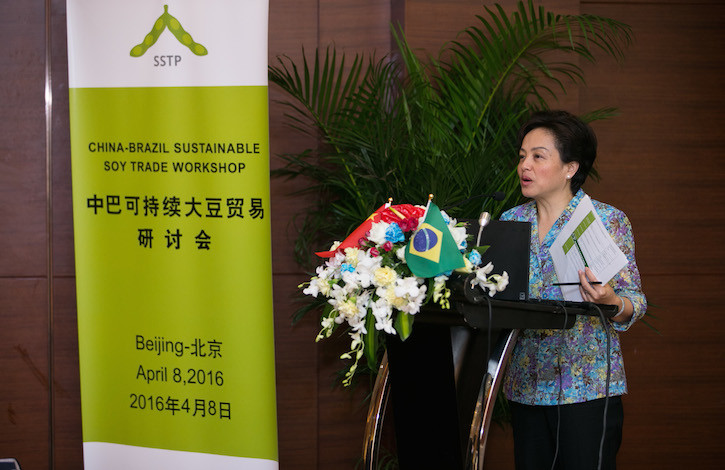
Some 40 Chinese soy importers, Brazilian soy officials, Chinese green trade experts, international sustainable production experts, and Chinese and Brazilian government officials gathered today in Beijing to discuss opportunities and challenges in driving more sustainable soy trade between China and Brazil.
At the meeting, officials from the China Soy Trade Association, Aprosoja, the soy production association of the state of Mato Grosso, and ABIOVE, Brazil’s Vegetable Oil Production Association, signed a memorandum of understanding, committing to work together to promote sustainable soy production and trade.
Officials from the Brazilian state of Mato Grosso’s soy producer association, Aprosoja, and the Brazilian vegetable oils industry association, ABIOVE, traveled to China to attend the one-day workshop, which was jointly organized by the Paulson Institute, the China Soybean Industry Association, Solidaridad, the Nature Conservancy and WWF funded by the Moore Foundation.
A wide range of guest speakers covered topics on global soy market trends and incentive mechanisms for sustainable soy production and procurement. The workshop opened with remarks by Rose Niu, chief conservation officer of the Paulson Institute, followed by remarks by Denggao Liu, vice president of the China Soybean Industry Association, and Andrea Bertolini, the agriculture attaché at the Brazilian Embassy in Beijing.
Fabio Trigueirinho of ABIOVE and Ricardo Arioli Silva of Aprosoja discussed Brazil’s soy industry and sustainability initiatives being made in soy production. Xiankun Lu, Director of the IDEAS Centre Geneva discussed the implications of WTO policies on soy trade. Daniel Nepstad, executive director of the Earth Innovation Institute, introduced the jurisdictional approach to slowing down deforestation. Xiaoquan Zhang, associate director of the Nature Conservancy, China, discussed the current status of forest carbon markets.
During the group discussion, representatives from Sinograin, COFCO, CP Group and Hopefull Group shared and discussed their experiences in developing and adopting viable methods on sustainable supply chains, as well as the challenges that lie ahead. The workshop closed with the signing of the MOU between the China Soybean Industry Association, Aprosoja, and ABIOVE, with recognition for the need to build closer collaboration between the stakeholders in China-Brazil soy industry.



